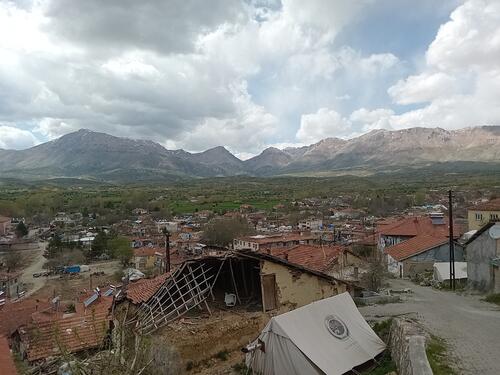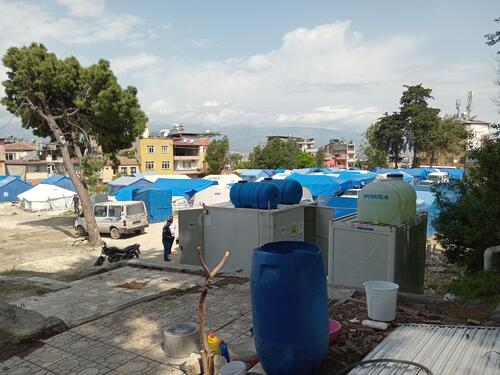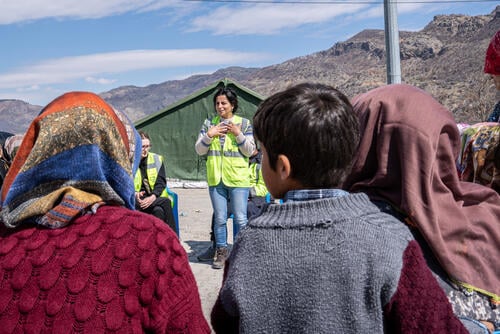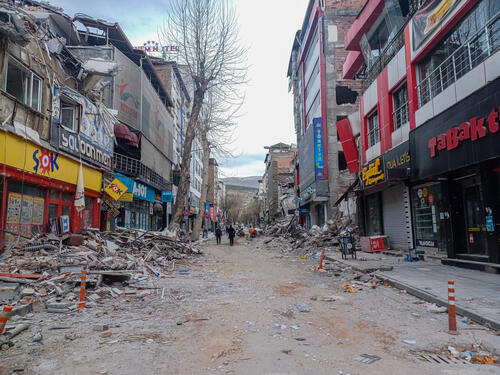Devastating earthquakes struck southeast Türkiye on 6 February and have left deep scars among those affected. Over 51,000 people died, 210,000 buildings collapsed and 890,000 suffered heavy or moderate damage due to the earthquakes and aftershocks.
“The first days were dark ones. Our people were miserable and hungry. It was cold,” says Ali, elected community leader of the Sofular neighbourhood in Antakya, Hatay.
“The situation was wretched. No one knew what to do. Where were their family members, their neighbours, their sons and their daughters? No one knew,” says Ali.
“We have struggled to come back to our senses since the earthquakes,” says Birgül, from Adıyaman. “We cannot even stay in a room alone. We choose to stay together to support one another,” she says.
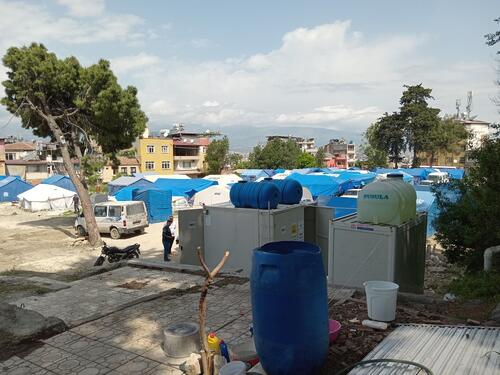
Immediate response to the earthquakes
Birgül is just one of around 9.1 million people directly affected by the earthquakes, out of whom 5.2 million still require humanitarian assistance. Although the initial phase of the response is over, there are still longer-term needs to be met, especially when it comes to mental health, water and sanitation services, and the provision of hygiene and other essential items.
Since the earthquakes, Médecins Sans Frontières (MSF) supported Turkish civil society and non-governmental organisations (NGOs) in responding to the mental health and psychosocial support as well as water and sanitation needs.
“Initially, the biggest issue was entering the camps, deploying the toilets and showers, and getting everything connected. Early on the supply chain was very challenging,” says Wayne Chang, water and sanitation manager working with the MSF-supported NGO, Yardım Konvoyu.
We cannot even stay in a room alone. We choose to stay together to support to one another.Birgül, survivor from Adıyaman
By the end of April, MSF-supported NGOs had provided and installed 61 water tanks, 312 toilets, 160 showers, and delivered over 2.5 million cubic metres of potable water to affected people. Furthermore, 96.6 tons of fruits and vegetables, 390,500 meals, 53.1 tons of firewood, 38,154 hygiene kits, 321 tents, 31 containers, and other materials were donated and distributed to people in need.
Responding to various community needs
Turkish NGOs, supported by MSF together and other aid organisations, also donated a water pump and water tanks to the damaged Hatay Training and Research Hospital. The hospital had to move its services to a field-tent hospital established in its courtyard.
“Due to the lack of toilets and water supply within the initial 72 hours following the earthquakes, we had to find alternative ways to address the essential needs,” says Selami, first-response volunteer and medical technician at the hospital.
“However, once the water tanks arrived, the situation improved significantly and we were able to meet sanitation needs more comfortably.”
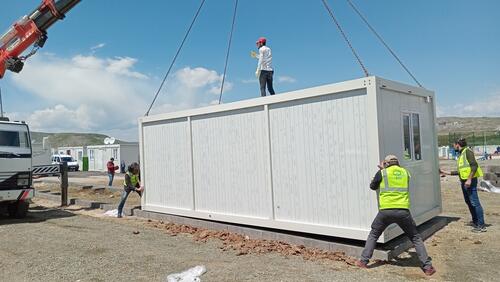
A safe space
As of 4 May, some 2.6 million people still live in tents, while over 157,000 people are accommodated in 85,500 containers. In response, our teams provided technical and financial support to local NGOs, to build and establish three psychosocial and living centres in Adıyaman, Malatya and Kahramanmaraş, called “NEFES”. “Nefes” is a common Turkish word that describes what these centres offer: the opportunity to take a deep breath following the consequences of the earthquakes.
“These are a safe havens in central locations, open to all people, especially to women and girls,” says Marcus Bachmann, MSF emergency coordinator. “Not only do they offer psychosocial support, but also activities for children, as well as washing machines and showers. They also offer separate rooms for lactating mothers so that they can breastfeed in peace.”
“Given the number of people who are accommodated in tents and containers, there was a need for a warm and safe place, where people could feel comfortable and access psychosocial support and other services,” says Hanen Çiftdoğan, project coordinator of local NGO Imece Inisiyatifi.
“We created a space where psychologists and psychiatrists could also conduct individual sessions.”
All MSF relief activities in Türkiye are carried out by supporting local organisations, including Imece Inisiyatifi, Yardım Konvoyu, Maya Vakfı and others. Since the early phase of the earthquake response, MSF-supported NGOs have been active in Adıyaman, Gaziantep, Hatay, Kahramanmaraş, Kilis, and Malatya provinces, delivering much-needed aid and relief to the affected people.



